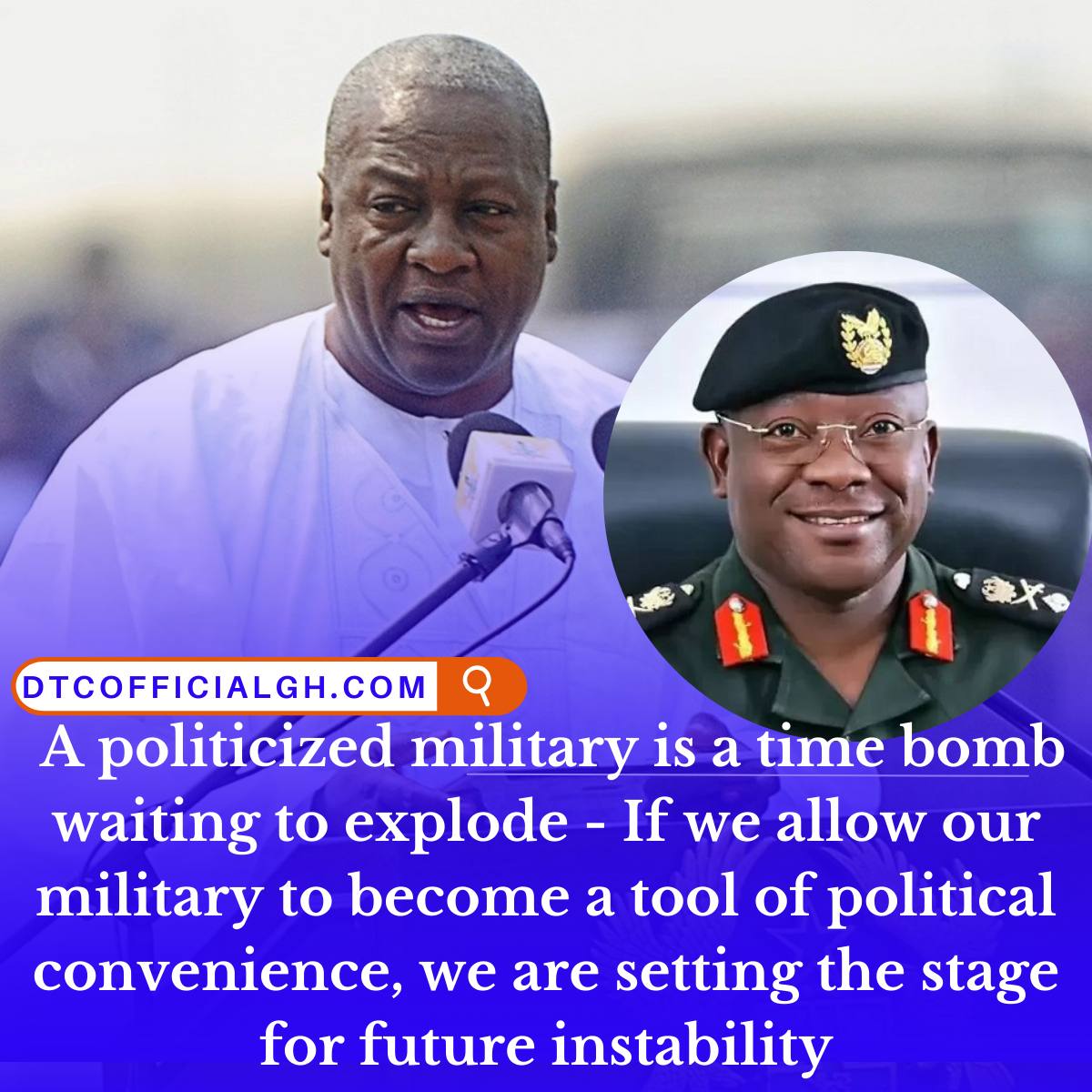The Silent Coup: How Politicizing the Military Threatens Ghana’s Stability

For days, I have struggled to make meaning of President Mahama’s recent appointments in the Ghana Armed Forces. While I acknowledge that the appointment of a Chief of Defence Staff is a political decision exercised by the President, I have never seen it done in a manner that completely disregards military tradition and natural progression. The recent reshuffle is more than just a routine change in command—it is a fundamental restructuring of the military’s leadership hierarchy that sets a dangerous precedent.

The implications of this decision are enormous. Not only has it disrupted the chain of command, but it has also triggered the forced retirement of several seasoned officers, creating an artificial leadership vacuum. If history has taught us anything, it is that a politicized military is a time bomb waiting to explode.
Dismantling Natural Progression: A Reckless Move
One of the most alarming aspects of this reshuffle is how it has dismantled the well-established leadership pipeline within the Ghana Armed Forces. The newly appointed Chief of Defence Staff, Brigadier General William Agyapong, is from Intake 30. This means the President deliberately bypassed officers from Intakes 27, 28, and 29, despite the fact that the outgoing Chief of Defence Staff, General Oppong-Peprah, was from Intake 26.
READ ALSO: Is This the Lean Government Ghanaians Were Promised?
The consequences?
- Four entire intakes of experienced officers will now be retired prematurely.
- Officers from Intakes 30 and 31, who were only recently commissioned as full Lieutenants, will be forced into retirement.
- A surge in retirements at the level of Full Colonel and above, all of whom will retire on full salaries, placing additional strain on the already stretched national budget.
This mass retirement of highly trained and experienced personnel is not just wasteful—it is a strategic blunder. These are individuals who have spent decades mastering military strategy, intelligence, and security operations. Retiring them in one sweep means the country is losing decades of institutional memory overnight.
READ ALSO: Income From Betting Should Be Taxed Like Any Other Revenue Stream.
The Cost of Ego: A Nation Pays the Price
The financial and logistical burden of this decision is staggering. Each retiring General is entitled to:
- A state-provided vehicle
- A driver
- Bodyguards
- Personal cooks
- State-sponsored accommodation
These are all lifelong benefits despite the fact that these officers will no longer contribute to national security. Now, with this wave of forced retirements, the state must also appoint and train new Generals, further increasing the wage bill and stretching the military’s budget.

Why are we wasting such valuable human resources just to satisfy political ambitions? Why sacrifice operational efficiency for political expediency?
The Consequences We Will Soon Face
The long-term effects of this decision will be far-reaching, and none of them bode well for Ghana’s future:
- Erosion of Meritocracy – The military is one of the few institutions that has remained relatively free from political interference. Promotions have traditionally been based on merit, experience, and leadership capabilities. But with this move, we are seeing political considerations override professionalism, signaling to younger officers that career progression is no longer about dedication, but about who is in power.
READ ALSO: Tech employees are getting the message: Playtime’s over
- Weakened Military Morale – Imagine dedicating your life to serving your country, working your way up the ranks, only to be forcefully retired due to political maneuvering. Officers who remain will see this as a clear message: their future is not in their hands but at the mercy of political interests. This will lead to widespread dissatisfaction, disengagement, and possibly even resignations.
- Command Instability and Leadership Vacuum – With seasoned Generals being retired en masse, we will have newly appointed officers leading the military without the depth of experience needed to command respect and authority. This weakens the entire structure of the armed forces, leaving Ghana vulnerable both internally and externally.
READ ALSO; An Urgent Call for a Sustainable Approach to Teacher and Nursing Training Allowances
- A National Security Threat – A military that is constantly reshuffled for political reasons loses its operational readiness. If Ghana were to face an external security threat or an internal crisis, we would be relying on a leadership team that has not had time to establish cohesion or experience in high-pressure situations. This is a serious national security risk.
We would to publish your story. Write to us at articles@dtcofficialgh.com
- Financial Strain on the Economy – The cost of forced retirements and new appointments is not just administrative—it has real economic implications. The state now has to maintain a larger number of retired officers while also financing new ones. In a country struggling with economic challenges, this is a reckless and unsustainable move.
Where Do We Go From Here?
This decision is not just a mistake—it is a warning sign. If we allow our military to become a tool of political convenience, we are setting the stage for future instability. Ghana’s armed forces have always been respected for their professionalism, discipline, and independence. We cannot afford to throw that away.
MUST READ; 5 Ways to Manage Your Personal Finances
Our leaders must start thinking strategically when it comes to personnel deployment. Every decision in the military should be made with national security in mind, not political interests. If this trend continues, we will find ourselves in a situation where the armed forces are no longer an institution of national defense, but an extension of political power—a reality that has led to instability and chaos in many other nations.
It is not too late to correct course. But if we do not, we may wake up one day to a military that no longer serves the people, but the politicians. And when that happens, it will be too late to turn back.
Follow us on Twitter and WhatsApp for more.





1 Response
[…] READ ALSO: The Silent Coup: How Politicizing the Military Threatens Ghana’s Stability […]